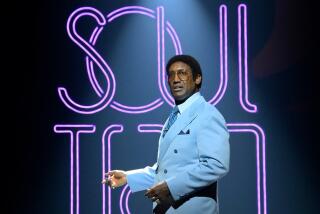Personal lives, political changes in ‘The Trip’
Miles Swain’s ambitious and moving “The Trip” is a journey well worth taking, encompassing a tender, wrenching love story set against an 11-year span of the gay rights movement, from 1973 to 1984. Swain balances the personal and the political, allowing his film to be intimate while keeping a larger perspective. It is refreshing to see people on screen who are living in a real world.
There is some first-film awkwardness; the harrowing concluding sequence that gives the film its title is a bit drawn out, and Swain tends to over-caricaturize the styles and trends of the ‘70s, the decade he was born. But the film’s occasional rough-around-the-edges quality fades alongside Swain’s flair for succinct characterization, his storytelling and, above all, his ability to create two involving central figures, portrayed with impressive range by his two young stars, Larry Sullivan and Steve Braun.
The film opens the year the American Psychiatric Assn. declassified homosexuality as a mental illness and concludes with the breakout of AIDS in the ‘80s. During that period, the gay community was hit by Anita Bryant’s homophobic campaign in 1977 and the assassination of pioneering San Francisco gay politician Harvey Milk the following year.
When Sullivan’s Alan and Braun’s Tommy meet, they are at opposite ends of the political spectrum. Tommy is an openly gay, committed activist, while Alan, a Young Republican, has just begun a career as a reporter at a Los Angeles daily; in an attempt to deny his homosexuality, he is completing a homophobic history of gays. But sex overwhelms politics, and Alan embarks upon the path of self-acceptance as his romance with Tommy flourishes. Alan is relieved that his publisher has dropped plans for the manuscript he now disowns.
Swain skillfully plots tumultuous developments in the lives of the lovers, triggered by Alan’s mentor, Peter (Ray Baker), a friend of Alan’s father (Art Hindle) from the military and a politically powerful attorney. Peter holds gay sex-and-drug orgies at his magnificent secluded estate (Rudolph Valentino’s Falcon’s Lair), but his public persona is that of a rugged conservative. Peter’s personal ambition and private desires outweigh the welfare of others; he wouldn’t hesitate to harm the interests of those of his own sexual orientation both on a political and personal basis. (Think Roy Cohn.) Swain may resort to melodrama and comic relief in telling this story, but it is anchored to a sure sense of psychological validity and blunt social realties.
Cinematographers Charles Barbee and Scott Kevan make the modestly budgeted “The Trip” look good. Baker is solid as a man who induces wariness -- but just the type to inspire trust in a naif like Larry. Alexis Arquette is fun as Tommy’s campy pal who grows increasingly serious, and Jill St. John lends crucial support as Alan’s glamorous, perceptive mother, carrying off the film’s key comic sequence. Sirena Irwin is stuck playing an embodiment of ‘70s fads; luckily, she turns up later as a surprisingly sane type.
In little more than 90 minutes, “The Trip” covers a lot of territory, and it adds up to quite an accomplishment.
*
‘The Trip’
MPAA rating: Unrated
Times guidelines: Adult themes and situations; some sex and violence
Larry Sullivan...Alan Oakley
Steve Braun...Tommy Ballenger
Ray Baker...Peter
Alexis Arquette...Michael
Jill St. John...Mary Oakley
A TLA Releasing and Falcon Lair Films presentation. Writer-director Miles Swain. Producer Houston King. Executive producers Tom Blount, Miles Swain. Cinematographers Charles Barbee, Scott Kevan. Editor Carlo Gustaff. Music Steven Chesne. Costumes Kristen Anacker, Cherie Sevilla Granger. Production designers David Touster, Donna Willinsky. Art directors Noel McCarthy, Don Burton. Set designer David Touster. Running time: 1 hour, 33 minutes.
Exclusively at the Sunset 5, 8000 Sunset Blvd., (310) 848-3500; the Playhouse 7, 673 E. Colorado Blvd., Pasadena, (626) 844-6500; and the University 6, Campus Drive opposite UCI, (800) 555-TELL.
More to Read
Only good movies
Get the Indie Focus newsletter, Mark Olsen's weekly guide to the world of cinema.
You may occasionally receive promotional content from the Los Angeles Times.









